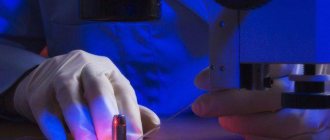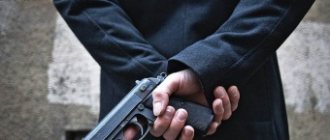1. Commitment by a private detective or an employee of a private security organization who has a private security guard certificate of actions that go beyond the powers established by the legislation of the Russian Federation regulating the implementation of private security and detective activities, and which entailed a significant violation of the rights and legitimate interests of citizens and (or) organizations or legally protected interests of society or the state, -
shall be punishable by a fine in the amount of one hundred thousand to three hundred thousand rubles, or in the amount of the wages or other income of the convicted person for a period of one to two years, or by restriction of liberty for a term of up to two years, or by forced labor for a term of up to two years with deprivation of the right to occupy certain positions or engage in certain activities for a term of up to three years or without it, or imprisonment for a term of up to two years with deprivation of the right to hold certain positions or engage in certain activities for a term of up to two years.
2. The same act, committed with the use of violence or with the threat of its use, or with the use of weapons or special means and entailing grave consequences, -
shall be punishable by imprisonment for a term of up to seven years with deprivation of the right to hold certain positions or engage in certain activities for a term of up to three years.
Commentary to Art. 203 of the Criminal Code of the Russian Federation
1. Private security and detective activities are regulated by the Law of the Russian Federation of March 11, 1992 N 2487-1 “On private detective and security activities in the Russian Federation.”
Article 1 of this Law defines private detective and security activities as the provision, on a paid contractual basis, of services to individuals and legal entities having a special permit (license) obtained in accordance with this Law, organizations and individual entrepreneurs in order to protect the legal rights and interests of their clients. The law also clearly defines the powers of a private detective, a private security guard and employees of private security and detective services.
2. The objective side of the crime (excess of authority) consists of the actions of a private detective or an employee of a private security organization that go beyond the powers established by the Law and entail a significant violation of the rights and legitimate interests of citizens and (or) organizations or legally protected interests of society or the state (about a significant violation see commentary to Article 201).
3. Part 2 of the commented article establishes liability for abuse of power committed with the use of violence or the threat of its use, or with the use of weapons or special means and resulting in grave consequences.
Violence includes any actions associated with physical impact on a person: tying up, handcuffing, causing physical pain, harm to health.
The threat of violence only covers the threat of physical force. A threat of a different nature, e.g. destruction of property, blackmail, excludes qualification under the commented article.
The use of weapons or special means means their intended use.
4. The elements of the crime in question are material. The act will be completed from the moment the socially dangerous consequences occur. It should be borne in mind that the concept of grave consequences is evaluative and must be established in each specific case. In particular, these include, for example, causing grievous harm to human health, suicide, murder or causing death by negligence. In all such cases, additional qualification is required under the relevant article of the Special Part of the Criminal Code of the Russian Federation.
In cases where actions exceeding authority form an independent crime, for example. wiretapping of telephone conversations, illegal search of a home, perusal of letters, etc., qualification is required for a set of crimes: under the commented article and articles providing for liability for violation of the secrecy of correspondence, telephone conversations and telegraph messages or related to violation of guarantees of personal integrity or dwellings.
5. The subjective side of the crime is characterized by guilt in the form of direct intent.
6. The subject of the crime is a special one - a private detective or an employee of a private security organization who has a certificate of a private security guard.
Judicial practice: Actions of a security guard that go beyond the scope of authority
Judge: Pochevalov N.V.
APPEAL DECISION
November 15, 2021
Saratov
Judicial panel for criminal cases of the Saratov Regional Court, consisting of: presiding Tsarenko P.P.,
judges of the panel Kulikova M.Yu., Tarasova I.A.,
under secretary Shamilova M.N.,
with the participation of prosecutor G.A. Yashkov,
victim FULL NAME1,
convicted Molochko A.F.,
defense lawyer – lawyer V.V. Grishin,
examined in open court a criminal case based on appeals 1ff9 and additions to them by the convicted A.F. Molochko. and lawyer V.V. Grishin, acting in his interests on the verdict of the Engelssky District Court of the Saratov Region dated August 11, 2021, by which
Molochko A.F., <date> of year of birth, native of <address>, citizen of the Russian Federation, with secondary specialized education, married, with a dependent young child, registered at the address: <address>, residing at the address: < address>, not previously convicted, convicted:
- according to Part 1 of Art. 203 of the Criminal Code of the Russian Federation to punishment in the form of a fine to the state in the amount of <data taken>;
- according to Part 2 of Art. 203 of the Criminal Code of the Russian Federation to punishment of 3 years 6 months of imprisonment with deprivation of the right to engage in security activities for a period of 3 years;
- according to Part 4 of Art. 111 of the Criminal Code of the Russian Federation to punishment of 9 years in prison.
Based on Part 3 of Art. 69 of the Criminal Code of the Russian Federation for the totality of crimes by partial addition of the imposed punishments, a final sentence was imposed in the form of imprisonment for a term of 12 years in a strict regime correctional colony with a fine to the state in the amount of <data taken>, with deprivation of the right to engage in security activities for a period of 3 of the year. The penalty in the form of a fine is carried out independently.
Having heard the report of judge Kulikov M.Yu., the speeches of the convicted Molochko A.F. and lawyer V.V. Grishin, who supported the arguments of the appeals and additions to them, the position of the victim FULL NAME1, who believed the verdict to be left unchanged, the opinion of prosecutor G.A. Yashkov, who considered the court verdict to be legal and justified, the judicial panel
installed:
Molochko A.F. found guilty of committing by an employee of a private security organization, having a private security guard certificate, actions that went beyond the powers established by the legislation of the Russian Federation regulating the implementation of private security activities, and entailed a significant violation of the rights and legitimate interests of citizens, as well as the same actions committed with the use of violence and entailing grave consequences; in addition, intentionally inflicting grievous bodily harm, dangerous to the life of a person, resulting in the death of the victim through negligence.
Crimes committed by A.F. Molochko to <address> under the circumstances detailed in the verdict.
In the appeal and additions to it, lawyer V.V. Grishin, acting in the interests of the convicted A.F. Molochko, expresses disagreement with the verdict, considers it illegal and unfounded, since the court’s conclusions do not correspond to the actual circumstances of the case and are not confirmed by the evidence examined in court hearing. He believes that the preliminary investigation authorities did not fully investigate the criminal case, and the court accepted only materials obtained by the investigation. Referring to the provisions of the Law of the Russian Federation “On Private Detective and Security Activities in the Russian Federation” dated March 11, 1992, he indicates that, as was established during the trial, Molochko A.F. did not receive a private security guard’s certificate and a personal security card, due to that his work was illegal. Believes that in this regard, Molochko A.F. is not subject to prosecution under Part 1. 1 and 2 tbsp. 203 of the Criminal Code of the Russian Federation, since there is no corpus delicti. Refuting the court's conclusions regarding the guilt of A.F. Molochko. under Part 4 of Article 111 of the Criminal Code of the Russian Federation, indicates that the conclusion of the forensic expert No. dated <date> that forms the basis of the verdict does not contain any methods and analysis, but there is only a recording of all bodily injuries of FULL NAME2, mechanism their formation by the expert is probabilistic in nature. Draws attention to the conclusion of a specialist, FULL NAME 5, provided by the defense, who came to the conclusion that the bodily injuries of FULL NAME 2, which resulted in his death, occurred from an impact when falling with acceleration on the protruding parts of a vertically located beam, and not from subsequent blows from A.F. Molochko. He believes that in the presence of such contradictions, a commission forensic medical examination should have been appointed, but the court unreasonably refused to do so. Refuting the court's conclusion that there were no actions on the part of FULL NAME2 and FULL NAME1 aimed at causing harm to A.F. Molochko. bodily injuries, refers to data during the preliminary investigation and in court the testimony of A.F. Molochko. that FULL NAME2 threatened him and tried to hit him with his head. Also, disagreeing with the conclusions of the conclusion of the forensic psychological and psychiatric examination No. dated <date>, he indicates that the preliminary investigation authorities did not raise the question of the location of A.F. Molochko. in a certain emotional state precisely on the day and hour of the crime he committed, on the basis of which he considered it necessary to order a repeat psychological examination, which the court of first instance unreasonably refused. In the presence of many mitigating and no aggravating circumstances, he considers the sentence to be excessively harsh. He asks that the verdict be overturned and that the criminal case be sent for a new trial to the same court in a different composition of the court.
In the appeal and additions to it, the convicted A.F. Molochko, expressing disagreement with the verdict, considers it illegal and unfounded, and the court’s conclusions are inconsistent with the factual circumstances of the case and not supported by evidence. Giving arguments similar to those of lawyer V.V. Grishin, he points out that there are significant contradictions between the conclusion of the forensic expert No. dated <date> and the conclusion of the specialist, FULL NAME5, that he did not have a private security guard’s ID or personal card. It draws attention to the fact that the preliminary investigation authorities and the court did not indicate or take into account that he wrote a confession. Refuting the testimony of FULL NAME1, he indicates that the latter was intoxicated, as a result of which he could not draw correct and objective conclusions. He also disagrees with the court’s conclusion that the presence of direct intent is evidenced by the method of causing bodily harm. He asks that the verdict be overturned and that the criminal case be sent for a new trial to the same court in a different composition of the court.
In objections to the appeal of the convicted person, Molochko A.F. representative of the victims FULL NAME4 and FULL NAME3 – lawyer Alkhimovich Yu.V. considers the verdict legal and justified.
In objections to the appeal of the convicted person, Molochko A.F. the victim FULL NAME1, not agreeing with the arguments of the convicted person, considers the sentence legal, reasonable and fair.
In objections to the appeal 666 complaint of lawyer V.V. Grishin. the victim, FULL NAME1, does not agree with the lawyer’s arguments, refuting them, and asks the verdict to remain unchanged.
In objections to the appeals of lawyer V.V. Grishin. and the convicted Molochko A.F. state prosecutor Suprun A.V. considers the arguments of the complaints to be unfounded. He asks that the appeals be dismissed.
The appeal presentation by the state prosecutor was withdrawn.
After checking the case materials, discussing the arguments of the appeals and additions to them, objections, the judicial panel comes to the following.
The court correctly established the factual circumstances of the case, assessing the totality of the evidence collected in the case, and came to a reasonable conclusion that the guilt of the convicted A.F. Molochko had been proven. in the commission by an employee of a private security organization who has a certificate of a private security guard, actions that go beyond the powers established by the legislation of the Russian Federation regulating the implementation of private security activities, and which entailed a significant violation of the rights and legitimate interests of citizens; an employee of a private security organization who has a certificate of a private security guard, actions that go beyond the powers established by the legislation of the Russian Federation regulating the implementation of private security activities, with the use of violence and resulting in grave consequences; intentional infliction of grievous bodily harm, dangerous to human life, resulting in the death of the victim through negligence.
The court's conclusions about the guilt of A.F. Molochko in the commission of the above crime correspond to the actual circumstances of the case and are fully confirmed by the totality of evidence verified and examined at the court hearing, namely:
- the testimony of the convicted Molochko A.F., that he worked as a security guard in a cafe and did not deny the fact that he struck the victim <date>;
- testimony of the victim, FULL NAME1, from which it follows that <date>, around night time he and his brother FULL NAME2 were in a beer bar <data taken>. They drank and were intoxicated. His brother - FULL NAME2 sang and danced in the bar. Security officer – Molochko A.F. began to push FULL NAME2 out of the premises, to which the latter began to express complaints, did not make any threats or insults. After this, Molochko A.F. struck first FULL NAME2, and then to him, from which they fell to the floor. He lost consciousness from the fall, and when he came to his senses, he saw his brother - FULL NAME2 lying without signs of life on the floor in the lobby of the bar, after which the arriving ambulance officers confirmed the death of FULL NAME2;
- testimony of witness FULL NAME6, from which it follows that from <date> to <date> she worked as an administrator of a cafe <data taken>, located at the address: <address>. Molochko A.F. worked as a security guard. That night, FULL NAME1 and FULL NAME2 were in the cafe, heavily intoxicated. FULL NAME2 fell asleep at the table, and she asked A.F. Molochko. deal with it. Subsequently, Molochko A.F. informed her that Full Name1 and Full Name2 had left. After some time, Full Name1 and Full Name2 again entered the cafe premises, waiting for a called taxi, while Full Name1 ordered beer to take with him at the bar, and Full Name2 began to dance and sing in the center of the hall. She again turned to A.F. Molochko to ask them to be escorted out of the cafe. Molochko A.F. began to push Full Name 2 out of the bar with his hands, and she saw Full Name 2 resting his forehead against A.F. Molochko’s forehead. after that she saw A.F. Molochko waving his arms. Subsequently, I saw in the hall how FULL NAME1 rose from the floor with blood on his face. FULL NAME2 was lying on the floor in an unconscious state;
- testimony of a witness FULL NAME10, from which it follows that he is the director <data taken>; from <date> to <date> in the beer bar <data taken> the protection of order was carried out by A.F. Molochko, who was officially employed in <data taken> from <date> and had the qualification of an even security guard of the 4th category, assigned by the commission of the Main Directorate of the Ministry of Internal Affairs of Russia for the Saratov Region; <date>, during the period of time <data taken> a hotel security guard called him on his cell phone <data taken> FULL NAME7 who explained that the security guard of the pub <data taken> Molochko A.F. There was a conflict with the visitors of the establishment, during which Molochko A.F. used physical force and one of the visitors is unconscious as a result. Upon arrival at the beer bar <data taken>, he saw a man lying without signs of life. I learned from the bar employees that A.F. Molochko, escorting FULL NAME1 and FULL NAME2 from the bar premises, beat the latter. Use force Molochko A.F. should not have, since there were no grounds for this;
- testimony of a witness FULL NAME8, from which it follows that he is an inspector of licensing work at the Engelskoye Municipal Administration of the Ministry of Internal Affairs of Russia, Saratov Region; <date>, from citizen A.F. Molochko to the licensing group of the MU Ministry of Internal Affairs of Russia “Engelskoe” of the Saratov region, an application to provide him with a private security guard certificate; in addition to the statement, Molochko A.F. All necessary documents were provided to the licensing group. After verification, a decision was made to extradite A.F. Molochko. private security certificates; <date> addressed to A.F. Molochko the head of the regional CRLL of the Main Directorate of the Ministry of Internal Affairs of Russia for the Saratov Region signed a certificate of a 4th category security guard, which <date> was received by the licensing group of the MU Ministry of Internal Affairs "Engelskoye" of the Saratov Region, about which a notification was sent to A.F. Molochko;
- the conclusion of a forensic medical examination of the corpse, FULL NAME2, the death of the latter was caused by blunt force <data taken>; During a forensic medical examination of the corpse, FULL NAME2, injuries of group “A” were discovered: <data taken>; injuries of group “A” were caused by at least three traumatic impacts of a blunt hard object (objects), which are regarded in the aggregate as causing serious harm to health on the basis of danger to life; injuries of group “A” are in a cause-and-effect relationship with the occurrence of death; injuries of group “A” were formed intravitally in approximately a period of time from units to tens of minutes before the moment of death; injuries of group “B”: <data withdrawn>, which were caused by at least one impact of a blunt hard object (objects), are regarded as not entailing short-term health disorders; injuries of group “B” were formed intravitally in approximately a period of time, from units to tens of minutes (but not more than 1-1.5 hours) before the moment of death; group B injuries are not causally related to death; since injuries of groups “A” and “B” were caused by the impact of blunt hard objects, the possibility of their formation cannot be ruled out as a result of blows from fists or feet while wearing shoes;
- a copy of certificate No. dated <date>, according to which Molochko A.F. Qualified as a 4th grade security guard;
-protocol of seizure of a private security guard’s ID in the name of A.F. Molochko;
- a copy of order No. dated <date>, according to which Molochko A.F. appointed to the position of security guard <data taken>;
- a certificate according to which Molochko A.F. from <date> to <date> was at the workplace while performing the duties of a private security guard;
- protocols of inspection of the scene of the incident, seized items, as well as other evidence given in the verdict and confirming the time, place, method and other circumstances of the crime A.F. Molochko. crimes.
The court had no reason to doubt the above evidence; it was obtained in accordance with the requirements of Art. 74, 86 of the Code of Criminal Procedure of the Russian Federation, correspond to the actual circumstances of the case, do not contradict each other, and therefore were correctly used by the court as the basis for the guilty verdict.
The court gave a proper assessment to all the evidence examined, including the testimony of the convicted A.F. Molochko, victim FULL NAME1, prosecution witnesses, the conclusion of the forensic medical examination, while the court’s conclusions about why it accepted some of them and rejected others are sufficient are argued in the verdict, so the complaints in this part are unfounded.
Contrary to the arguments of the convicted person, the court reasonably based the verdict on the testimony of the victim, FULL NAME1, since they are logical and consistent, consistent with other evidence in the case.
Taking into account the above, it is impossible to agree with the arguments of the appeals about the inconsistency of the court’s conclusions with the actual circumstances of the case, the incorrect classification of the offense, since they are refuted by the evidence examined by the court.
The presence of the defendant’s direct intent to inflict grievous bodily harm on the victim is evidenced by the nature and location of the bodily injuries inflicted—multiple blows to the victim’s head.
Taking into account all the examined evidence in the aggregate, the court made the correct conclusion about the existence of a cause-and-effect relationship between the actions of A.F. Molochko, who caused FULL NAME2 serious harm to health on the grounds of danger to life, and the resulting consequences in the form of the death of the victim.
The arguments of the complaints that A.F. Molochko did not have a certificate of a private security guard, as a result of which his work was illegal, are recognized by the judicial panel as unfounded. As it was established, based on the results of consideration of the application of Molochko A.F. on the provision of a certificate of a private security guard and verification of his identity <date> the head of the CRLL of the Main Directorate of the Ministry of Internal Affairs of Russia for the Saratov Region signed a certificate of a 4th category security guard in the name of Molochko A.F. in the cafe <data taken> confirmed by the head of the private limited company FULL NAME10
The argument that Molochko A.F. I did not receive a private security guard’s certificate, as a result of which his actions cannot be qualified under Part 1 and Part 2 of Art. 203 of the Criminal Code of the Russian Federation also cannot be considered ff8 justified, since the certificate is essentially a document confirming the powers of a private security guard, and the powers are vested in a person by a government body. As can be seen from the case materials, the procedure for vesting Molochko A.F. The powers of the private security guard were fully respected, as a result of which the qualification of his actions under Article 203 of the Criminal Code of the Russian Federation is correct.
Contrary to the arguments of the appeals, the conclusions set out in the verdict do not contain significant contradictions that influenced or could influence the resolution of the issue of guilt or innocence of the convicted person, the correct application of the criminal law and the determination of the penalty.
The arguments of the appeals about the non-involvement of the convicted person in causing grievous harm to health, dangerous to the life of a person, resulting in the death of FULL NAME2 through negligence, were verified at the court hearing, found an assessment in the verdict and were reasonably recognized as untenable.
Having assessed the evidence examined at the court hearing in its entirety, the court correctly came to a reasonable conclusion that the convicted person was guilty of committing crimes, and correctly qualified the actions of A.F. Molochko. under Part 1 of Article 203 of the Criminal Code of the Russian Federation, Part 2 of Art. 203 of the Criminal Code of the Russian Federation, Part 4 of Art. 111 of the Criminal Code of the Russian Federation. The judicial panel does not see any grounds for reclassifying the actions of the convicted person or acquitting him.
The panel of judges cannot agree with the arguments that it was necessary to appoint a commission forensic medical examination in the case, since, as the court of first instance correctly indicated in the verdict, the conclusion of the forensic medical examination No. dated <date> was carried out by qualified experts who have experience and work experience, is scientifically based, with methods and analysis provided, and therefore does not raise doubts in the court. The court of first instance was justifiably critical of the conclusion of the specialist FULL NAME5 presented by the defense, since, as follows from the record of the court session, this expert could not explain by what criteria and reasons he made the conclusions indicated in the conclusion. Thus, there were no grounds for ordering a commission forensic medical examination. The judicial panel also agrees with the court's conclusions, which also does not see any grounds for appointing and conducting a commission forensic medical examination.
The argument that the victim FULL NAME2 tried to hit A.F. Molochko, threatened the latter, is refuted by the testimony of the victim FULL NAME1 and witness FULL NAME6, according to which there were no aggressive actions against A.F. Molochko. there was no FULL NAME1 and FULL NAME2. To the testimony of Molochko A.F. the court was justifiably critical as a way of defense in order to evade responsibility. The judicial panel does not see any grounds for re-evaluating the evidence.
With the argument that in relation to Molochko A.F. it is necessary to order a second psychological examination, the judicial panel does not agree, since the conclusion of the forensic psychological and psychiatric examination contained in the materials of the criminal case No. dated <date> was carried out by qualified experts with experience and work experience, is scientifically substantiated, with methods and analysis.
The court rightfully treated the testimony of the interrogated, at the request of the defense, specialists FULL NAME5 and FULL NAME9 critically, setting out in detail its conclusions about this in the verdict.
The convict's argument that the preliminary investigation authorities and the court did not take into account his confession is not supported by the materials of the criminal case, since information about the confession of Molochko A.F. they do not contain.
Taking into account the above, neither during the preliminary investigation in a criminal case nor during the trial are there any procedural violations that would entail the reversal of the verdict in the case.
Verdict against Molochko A.F. complies with the requirements of Art. Art. 307-309 Code of Criminal Procedure of the Russian Federation.
As follows from the minutes of the court session, the presiding officer complied with the requirements of Art. Art. 15 and 243 of the Code of Criminal Procedure of the Russian Federation to ensure adversarial rights and equality of the parties. The minutes of the court session reflect the motions of both the prosecution and the defense.
All petitions submitted by the parties were resolved in accordance with the requirements of Articles 122 and 271 of the Code of Criminal Procedure of the Russian Federation; there were no violations of the procedure for making a decision by the court on the submitted petitions. The court took all measures provided by law for a comprehensive, complete and objective examination of the circumstances of the case.
The judicial investigation was carried out in accordance with the requirements of Art. Art. 273-291 Code of Criminal Procedure of the Russian Federation. All the evidence presented by the parties was considered by the court, decisions were made on it in the manner prescribed by law, including on the evidence referred to in the complaints by the defense lawyer and the convicted person.
There was no evidence of the investigation of inadmissible evidence, the erroneous exclusion of admissible evidence from the proceedings, or the refusal of a party to study evidence that could be significant for the outcome of the case.
There were no violations of the adversarial principle at the trial. At the court hearing, all evidence essential to the outcome of the case was examined, and there were no unfounded refusals to the convict and his defense attorney to examine evidence that could be significant to the outcome of the case.
When assigning the convicted person Molochko A.F. punishment, court, based on the provisions of Art. 60 of the Criminal Code of the Russian Federation, took into account the nature and degree of public danger of the crimes he committed, information about his personality, the presence of a number of mitigating and absence of aggravating circumstances, the impact of the imposed punishment on the correction of the convicted person. In this regard, the judicial panel recognizes the arguments of the complaints about the excessive severity of the imposed punishment as unfounded.
The court's conclusion that the correction of Molochko A.F. is possible only in conditions of isolation from society, the sentence is properly motivated and justified.
The judicial panel does not see any grounds for reducing the sentence of the convicted person, which is fair and proportionate to the crime.
The panel of judges agrees that the grounds for imposing a sentence on a convicted person using the provisions of Art. 64, part 6 art. 15 of the Criminal Code of the Russian Federation, the court of first instance did not have it.
Based on the above and guided by Art. 389.13, 389.20, 389.28 Code of Criminal Procedure of the Russian Federation, judicial board
DEFINED:
Verdict of the Engelssky District Court of the Saratov Region dated August 11, 2021 in relation to A.F. Molochko. leave unchanged the appeals and additions to them of the convicted A.F. Molochko, and the lawyer V.V. Grishin. - without satisfaction.
Presiding
Panel judges
rospravosudie.com
Share link:
- Click here to share content on Facebook. (Opens in a new window)
- Click to share on WhatsApp (Opens in new window)
- Click to share on Telegram (Opens in new window)
- Click to share on Twitter (Opens in new window)
Similar
Judicial practice: sentences and punishment under Art. 203 of the Criminal Code of the Russian Federation
- Resolution of the Plenum of the Supreme Court of the Russian Federation dated... PLENARY OF THE SUPREME COURT OF THE RUSSIAN FEDERATION DECISION dated December 27, 2002 N 29 ON JUDICIAL PRACTICE IN CASES OF THEFT,...
- Decision of the Supreme Court: Determination N 203-APU17-21... THE SUPREME COURT OF THE RUSSIAN FEDERATION Case No. 203-APU17-21 APPEAL DECISION Moscow August 31, 2021 Judicial Collegium for Military Personnel of the Supreme...
- Resolution of the Plenum of the Supreme Court of the Russian Federation dated... PLENARY OF THE SUPREME COURT OF THE RUSSIAN FEDERATION DECISION of November 15, 2021 N 48 ON THE PRACTICE OF APPLICATION BY COURTS OF LEGISLATION GOVERNING FEATURES...
- Resolution of the Plenum of the Supreme Court of the Russian Federation dated... PLENAUM OF THE SUPREME COURT OF THE RUSSIAN FEDERATION DECISION dated June 25, 2021 N 18 ON JUDICIAL PRACTICE IN CASES OF CRIMES,...
- Decision of the Supreme Court: Resolution No. 310P13 dated... DECISION OF THE PRESIDIUM OF THE SUPREME COURT OF THE RUSSIAN FEDERATION Case No. 310-P13 Moscow January 23, 2014 Presidium of the Supreme Court of the Russian Federation...
- Resolution of the Plenum of the Supreme Court of the Russian Federation dated... PLENAUM OF THE SUPREME COURT OF THE RUSSIAN FEDERATION DECISION dated December 17, 2021 N 43 ON SOME ISSUES OF JUDICIAL PRACTICE IN CASES...
- Resolution of the Presidium of the Supreme Court of the Russian Federation dated... PRESIDIUM OF THE SUPREME COURT OF THE RUSSIAN FEDERATION DECISION dated December 5, 2018 N 126-P18 ON RESUMING PROCEEDINGS IN THE CASE DUE TO NEW...
- Ruling of the ECtHR dated 02/14/2017 EUROPEAN COURT OF HUMAN RIGHTS THIRD SECTION CASE “MASLOVA VS. RUSSIAN FEDERATION” (Complaint No. 15980/12) JUDGMENT…
- Judicial Collegium for Criminal Cases, appeal:... THE SUPREME COURT OF THE RUSSIAN FEDERATION Case No. 72-APU 17-21 APPEAL DECISION Moscow October 04, 2021 Judicial Collegium for Criminal Cases...
- Decision of the Supreme Court: Determination No. 56-КГ16-46 dated... THE SUPREME COURT OF THE RUSSIAN FEDERATION No. 56-КГ16-46 DETERMINATION Moscow March 6, 2017 Judicial Collegium for Civil Cases of the Supreme Court...







